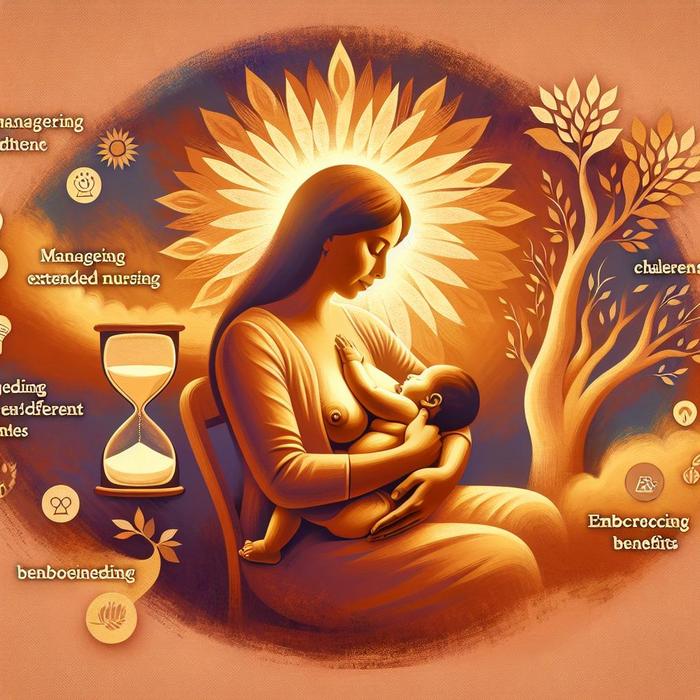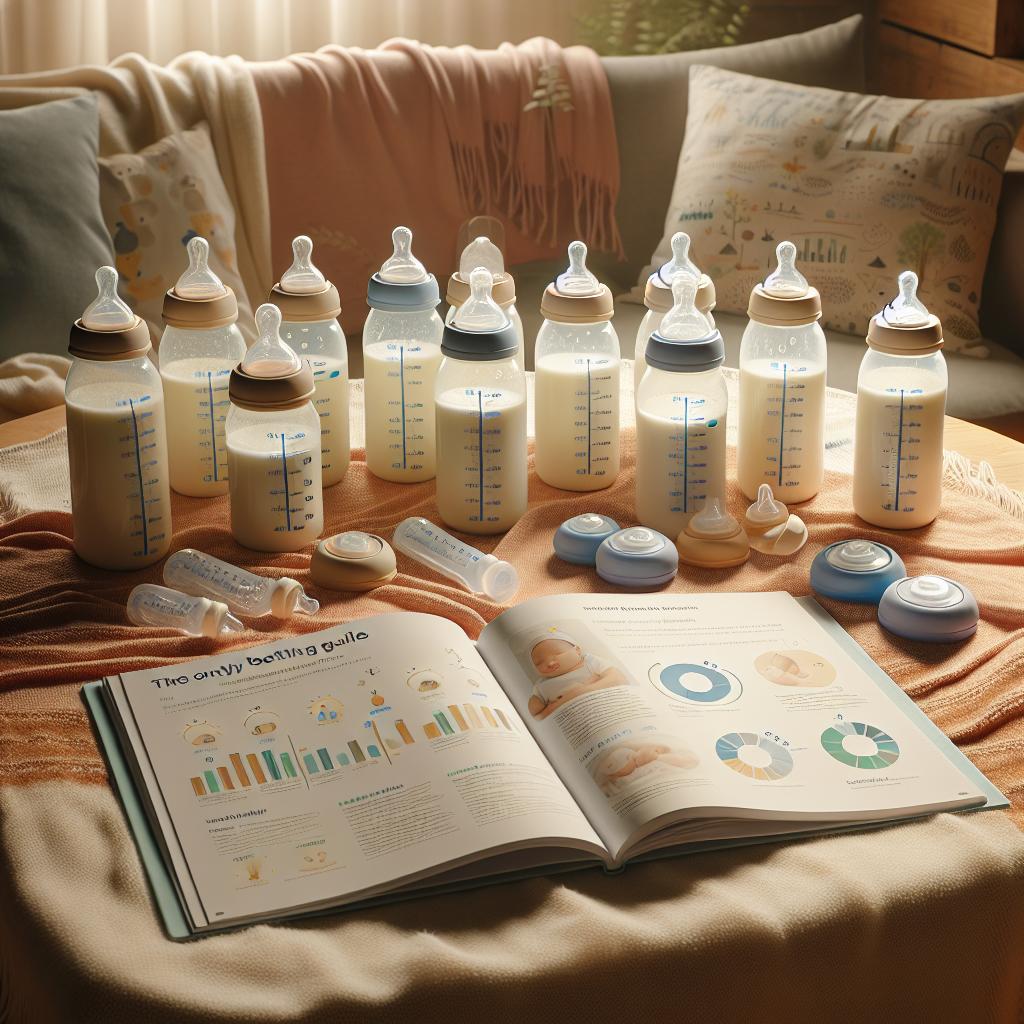Extended Breastfeeding: Breaking the Stigma and Overcoming Challenges
As a society, we’ve been conditioned to think of breastfeeding as a temporary aspect of new motherhood, something that lasts perhaps a year and then ceases. However, the concept of extended breastfeeding challenges this perspective and it’s slowly gaining acceptance. Extended breastfeeding, or breastfeeding beyond the first year of life, is a topic that’s often misunderstood. It can be a challenging endeavor, but also one that offers great rewards.
Managing Extended Nursing: Practical Tips
While the decision to continue breastfeeding past infancy is deeply personal, and ultimately one that only you can make, it’s important to be prepared. Here are a few extended breastfeeding tips that will help you manage this journey:
- Set clear boundaries: As your child grows older, they become more independent and mobile. It’s important to set clear breastfeeding boundaries that work for both you and your child.
- Manage night nursing: Night nursing can be a challenge with older toddlers. Establish a bedtime routine, gradually reducing nighttime feeds. Having a supportive partner that can soothe your child back to sleep is also beneficial.
- Invest in the right clothing: A wardrobe that includes nursing-friendly clothing will make feeding easier, more discreet, and more comfortable for both you and your baby.
- Self-care is essential: Extended breastfeeding can take a toll on your physical and mental health. Prioritizing self-care and seeking support is crucial.
Each of these tips intertwine and help in using modern tools for parenting in a way that enhances and supports your extended breastfeeding journey.
The Benefits of Long-term Breastfeeding: What the Research Says
While it’s easy to focus on the challenges, it’s important to also acknowledge the benefits of long-term breastfeeding. The World Health Organization recommends breastfeeding up to two years of age or beyond because of the numerous health benefits it provides to both mother and child. Some of these benefits include:
- Nutritional benefits: Breast milk continues to provide high-quality nutrients well past infancy, aiding in a child’s overall health and development.
- Boosted immunity: Breast milk contains immunity-boosting antibodies that can help protect children from illness, even as they start to explore the world around them.
- Increased bonding: The bond between mother and child during nursing continues to strengthen during extended breastfeeding.
- Health benefits for mothers: Women who breastfeed for longer periods have reduced risks of breast and ovarian cancer, osteoporosis, and cardiovascular disease.
From fostering growth and nurturing your baby’s development to finding mental peace amid the whirlwind of parenthood, these invaluable benefits can make the journey worth it.
Overcoming Challenges: Persistence and Patience
As you venture into the realm of extended breastfeeding, remember that every journey is unique. Some days may feel overwhelming and fraught with challenges, from societal pressure to physical discomfort. However, with persistence, patience, and a good support system, you can overcome these challenges and continue to nourish and nurture your child.
Understanding and managing extended nursing is about more than merely dealing with societal perspectives and ensuring proper nutrition. It’s about a comprehensive understanding of your child’s needs, your comfort, and the dynamic impact breastfeeding can have on your parenting journey. Extended breastfeeding has its share of trials and triumphs, but it can also lead to a depth of connection and benefits that make the challenges worth it.
Lifting the Stigma Surrounding Extended Breastfeeding
Extended breastfeeding has traditionally been met with a great deal of societal stigma, rather misjudging it as an unusual or strange practice. However, it’s essential to educate yourself and others about the benefits and normalcy of this practice. Sites like Happiest Baby offer reliable resources that debunk myths and give informed perspectives on extended breastfeeding. Remember that your breastfeeding journey is personal and should align with your comfort and your child’s needs, regardless of societal opinion.
A Closer Look at The Health Advantages of Extended Breastfeeding
Extended breastfeeding offers a host of health benefits to a child well into their toddler years and early childhood. As per the Cleveland Clinic, breast milk provides essential nutrients that support the development of strong teeth, prevents infection, and reduces the risk for chronic diseases. The benefits are not just limited to children. Moms, too, can have reduced risks of diabetes, rheumatoid arthritis, high blood pressure, high cholesterol, heart disease, and some forms of cancer.
A Nourishing Bond: The Emotional Benefits of Extended Breastfeeding
Extended breastfeeding extends beyond physical health benefits; it also beautifully nurtures the emotional bond between mother and child, facilitating a stronger connection. This unique practice provides comfort to toddlers and young children as they start exploring the world, dealing with the ups and downs of growing and learning. As a mother, you are not just providing best-in-class nutrition but also immeasurable emotional security.
Making Extended Breastfeeding a Nourishing Journey
Extended breastfeeding is a journey of commitment and patience. You need to trust your instincts and understand that doing what feels right for you and your child is the best way forward. There will be challenges, questions, and doubts, but it’s crucial to remember that you are not alone on this journey. Various resources can provide you with support, answers, and insights, and help you make the most of your extended breastfeeding experience.
The World Health Organization and Extended Breastfeeding
A key advocate for extended breastfeeding is the World Health Organization (WHO). WHO stresses the significance of breastfeeding up to two years of age or beyond, stating its valuable contribution to both mom and child health. A better understanding of these recommendations can give you the confidence to counter critics, educate naysayers, and feel secure in continuing your breastfeeding journey.
Conclusion
Extended breastfeeding is a personal journey that involves determination, sacrifice, and immense love. The benefits it bestows are vast, touching every aspect of mother and child well-being – physical, emotional, and psychological. There is a wealth of knowledge and support available to help you navigate any challenges that come your way. Remember, every breastfeeding journey is unique, and it’s perfectly okay to take your own path to nurturing your baby.







